The gas tax increase of 4 cents per gallon, which will eventually increase to 6 cents per gallon, as well as a diesel tax increase that will eventually reach 10 cents per gallon, both go into effect today, July 1, throughout Tennessee. The culprit for this tax increase is Governor Haslam’s IMPROVE Act – Improving Manufacturing, Public Roads and Opportunities for a Vibrant Economy – later renamed the Tax Cut Act of 2017.
As Tennesseans are forced to pay this higher tax, it’s time to review how it happened in a state with record revenues and a billion dollar surplus.
It started no later than 2015, when Governor Bill Haslam and Department of Transportation (TDOT) Commissioner John Schroer went on a taxpayer-funded six-week 15-city tour, meeting with elected officials, business leaders and chamber of commerce executives as well as “infrastructure officials and community members” creating a “need” and building support for a gas tax increase. At the time, there was a $6.1 billion backlog of road and bridge projects.
Davidson and Middle Tennessee counties that ring it, were provided Resolutions to be passed by their respective legislative bodies, most often a County Commission, that urged Governor Haslam and the Tennessee General Assembly that essentially encouraged increased funding, mainly for transit projects.
By the time the IMPROVE Act was introduced by the Governor on January 18, 2017, the TDOT backlog had grown to $10.5 billion, consisting of 962 projects with at least one in each of the 95 counties, creating leverage against every legislator in the Tennessee General Assembly. The list was translated into an interactive website called TDOT SPOT – Statewide Project Overview Tracker – which includes the name of the State Senator and Representative covering the district.
During his term as Governor, Haslam reduced the Highway Fund budget by 13 percent, while the state’s budget grew 20 percent before he proposed a gas tax increase. Meanwhile, TDOTs overhead increased 63 percent from $78.9 million to $117 million, while spending on actual roadwork under the category of Highway Infrastructure shrank by 33 percent.
One of the selling points of the gas tax increase to fund transportation was that it is a “user fee.” However, not all of the user fees go to transportation, with some diverted to the General Fund, Education and Debt, a situation that was not remedied by the IMPROVE Act, with the exception of the new revenues generated by the tax and fee increases.
In his 2017-18 budget, the Governor consumed the increased revenues the state has been receiving by allocating them to such emotional hot-button issues like teacher pay increases. The little publicized fact is that BEP (Basic Education Program) is a funding mechanism, and does not dictate how the LEA (Local Education Agency) spends the money. In other words, there are no requirements that when the funds get to the local schools systems they go toward teacher pay increases. Nonetheless, the topic is an effective tool for pressuring legislators.
Even more noteworthy about Governor Haslam’s 2017-18 budget is that the state portion of the appropriations is $17.9 Billion, excluding the unpredictable and strings-attached Federal funding the state receives. The goal of the gas and diesel tax increases and the registration fee increases was to raise about $300 Million, representing an insignificant 1.67 percent of the $17.9 Billion of the state’s budget, a fraction that the chief executive of the state should be able to manage.
A lobbying group, Tennessee Infrastructure Alliance, formed the Transportation Coalition of Tennessee with other lobbying groups that stood to directly benefit from increased spending on roads, including the Tennessee Road Builders Association, Concrete Paving Association of Tennessee, Tennessee Society of Professional Engineers.
The more surprising fact is that the Coalition included lobbying groups funded through dues paid from taxpayer dollars out of city and county budgets, such as the Association of County Mayors, Tennessee County Commissioners Association, Tennessee County Services Association and Tennessee County Highway Officials Association that then used those tax dollars to lobby for the gas tax increase against the very citizens paying the taxes.
At every legislative committee and subcommittee meeting, lobbyists as well as the Governor’s staff and state department officials packed the committee rooms, often leaving citizens standing or in the hallways outside the rooms.
Before its first meeting, the deck was stacked in the House Transportation Committee when gas tax proponent Rep. Barry Doss (R-Leoma) was appointed as Chair by Speaker Beth Harwell (R-Nashville). Doss had never served on the Transportation Committee prior nor had he ever been appointed as Chair of any Committee. Harwell appointed Doss to replace the previous Transportation Committee Chair, Rep. Jimmy Matlock (R-Lenoir City), who Harwell narrowly defeated in Matlock’s challenge to her as Speaker. Doss’s one qualification for chairing the Transportation Committee is that he owns Doss Brothers, Inc., a construction and paving company.
Further demonstrating the highly unusual nature of the change, the Transportation Committee Chair was the only one to change of the 15 full Committees (vs Subcommittees), except two brought about because the previous Chair was no longer a member of the House.
The first stop for the IMPROVE Act was the House Transportation Subcommittee chaired by Rep. Terri Lynn Weaver (R-Lancaster). The vote was expected to be close, but it came down to a tie when Rep. David Alexander (R-Winchester), considered a conservative and presumed to be against the IMPROVE Act, openly admitted to changing his mind after having dinner with the Governor immediately following a gas tax town hall Alexander hosted in his district.
After the thoroughly deceptive maneuver of attaching the Hawk Amendment to HB 534, the House version of the IMPROVE Act, which had a quarter percent of the unallocated sales tax revenues simply moved from the General Fund to the Highway Fund to fund transportation, initially failed.
After a recess and back hallway negotiations between House Republican leadership, the bill sponsor, the Governor’s office and Democrat Representatives, another vote was taken which ended in a tie. A tie would normally kill a bill.
But, Speaker Harwell once again influenced the process by sending in her designee, Speaker Pro Tem Curtis Johnson (R-Clarksville) to break the tie for a 5-4 vote in favor of advancing the bill to the full House Transportation Committee.
All the while, the subversive actions were being witnessed by a room full of citizens and the “gas can man” opposing the gas tax.
During the first hearing of the IMPROVE Act in the full Transportation Committee on March 8, despite several maneuvers by Chairman Doss, actions were delayed for what ended up being two weeks.
In the March 22 Transportation Committee meeting, Chairman Doss, “committed to get this vote out one way or the other,” broke House rules to ram HB 534 through to its next stop at the House Local Government Committee.
House Local Government Chair, Tim Wirgau (R-Buchanan), used tactics too often employed by chairman to put their thumb on the scales of bills as they pass through their committees, such as using their discretion in tallying voice votes and gaveling over the opposition.
The tactics were called out by Rep. Jerry Sexton (R-Bean Station) during a press conference where he called on Speaker Harwell and House Leadership to “hit the restart button” and send the bill back to the House Transportation Subcommittee for a fair and open debate.
Sexton’s request was ignored and HB 534 advanced from Local Government Committee to the House Finance Ways and Means Subcommittee and then full committee, where the bill passed through on voice votes by Chairman Gerald McCormick (R-Chattanooga) and Charles Sargent (R-Franklin), respectively, the full Committee having 23 members from which Sargent had to discern a vote count.
Notably, House bill sponsor Barry Doss had already been called out by the Tennessee Republican Assembly for a potential conflict of interest ethics violation when he continued to present the bill as the sponsor and renamed the gas tax increasing IMPROVE Act to the Tax Cut Act of 2017.
On the morning of the House floor vote, rumors were swirling about a deal Governor Haslam made with the Democrats to allocate $250 Million to an education fund. And, while there was denial of that deal, the truth later became evident when Democrats uncharacteristically voted yes on the IMPROVE Act, and committee video showed Democratic Caucus Leader Craig Fitzhugh (D-Ripley) revealing details of the deal.
With the Senate being almost silent on the issue, the only real fight against the gas tax was in the House, where it eventually passed on April 19 by a vote of 60 to 37 with more than half the Republicans voting in favor of it.
Proponents of the IMPROVE Act will tout the three tax cuts that are intended to be offsetting to the tax increases. That’s a hard story to sell, when the state portion of the budget has grown $4.5 Billion – a hefty 34 percent – since Governor Haslam came into office in 2011.
All three tax cuts have merit, as would the veterans and elderly tax relief, but likely would have passed on their own without tying them to the gas tax increase, and two of the tax cuts benefit only a small sector Tennesseans.
The F&E tax reduction benefits manufacturers only, with the largest portion of the reduction going to just 24 of those businesses.
The repeal of the Hall Income Tax was actually passed into law last year, rather creatively on the House floor due to opposition by Speaker Harwell and Governor Haslam. Both were against the repeal of the Hall Income Tax during last year’s session, until they could take credit for its passage this year.
The food tax decrease of one percent is being touted as a 20 percent reduction. All counties have an additional sales tax of at least 2 percent, and many cities also have a sales tax. When the minimum total sales tax Tennesseans pay on food purchased in grocery stores is 7 percent, it is disingenuous, at best, if not deceptive, to refer to a one percent decrease that applies only to the state portion as anything greater than a 14 percent reduction.
The IMPROVE Act, if not literally, certainly in spirit, is in violation of Article II, Section 17 of The Constitution of the State of Tennessee, where it states, “No bill shall become a law which embraces more than one subject, that subject to be expressed in the title.”
With the gas tax, diesel tax, liquified gas, and compressed natural gas tax increases, motor vehicle registration fee increase, authorization for local governments to raise seven other taxes, and reduction in the F&E tax, the already-approved Hall Income Tax reduction, and the food tax reduction, the IMPROVE Act could not possibly qualify as “one subject.”
With the perspective of hindsight, it is evident that over an extended period of time and through concerted and coordinated efforts by several individuals, numerous pieces were forced together for the purpose of imposing a gas tax increase on Tennesseans, leaving only the reasoning in question.

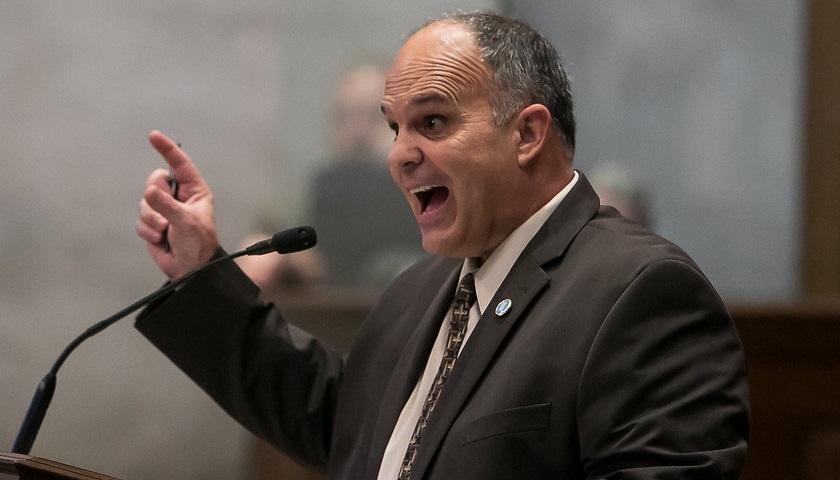


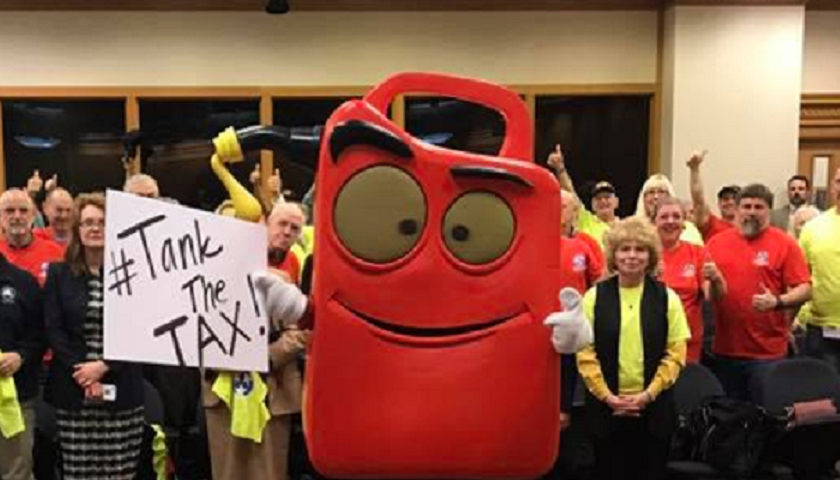
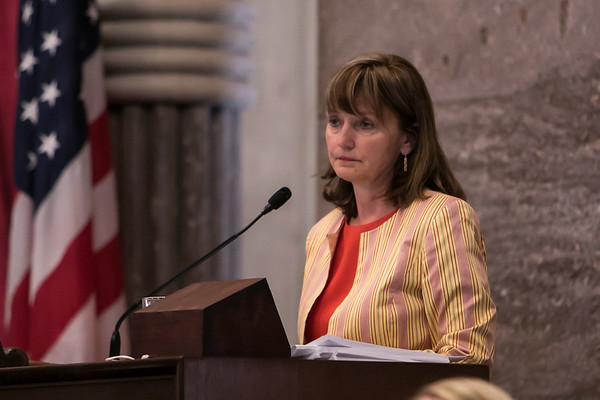
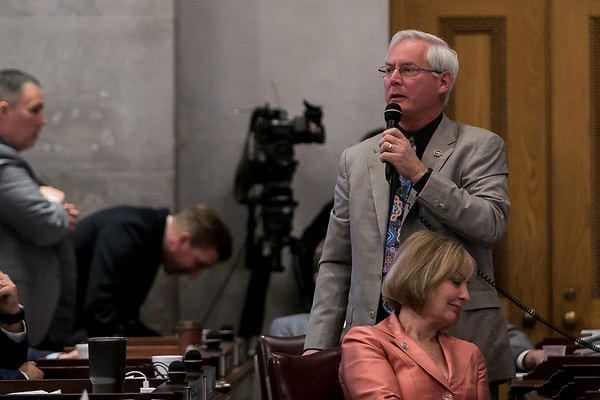
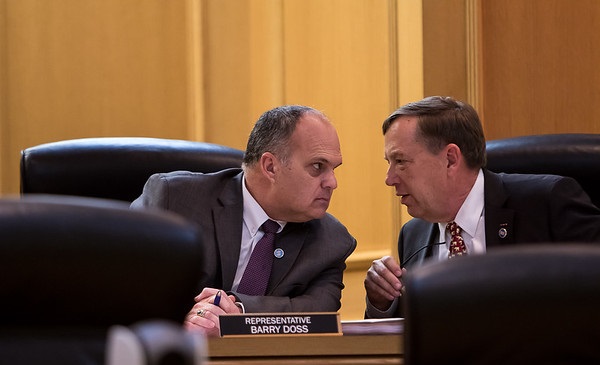
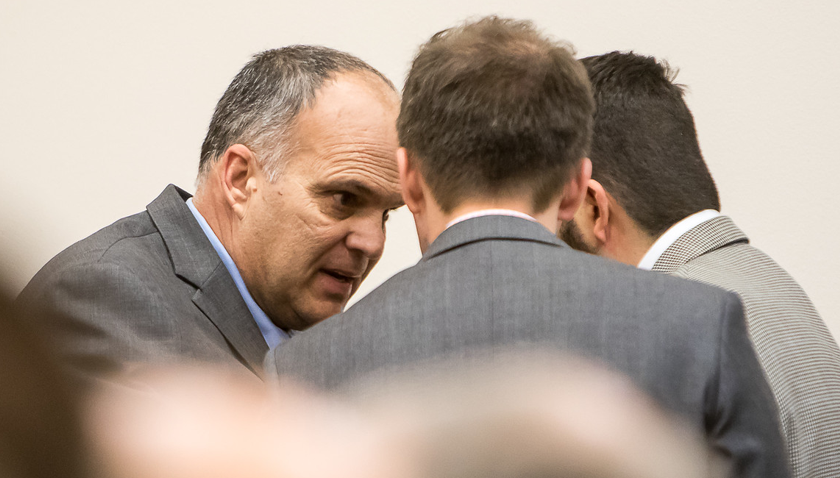
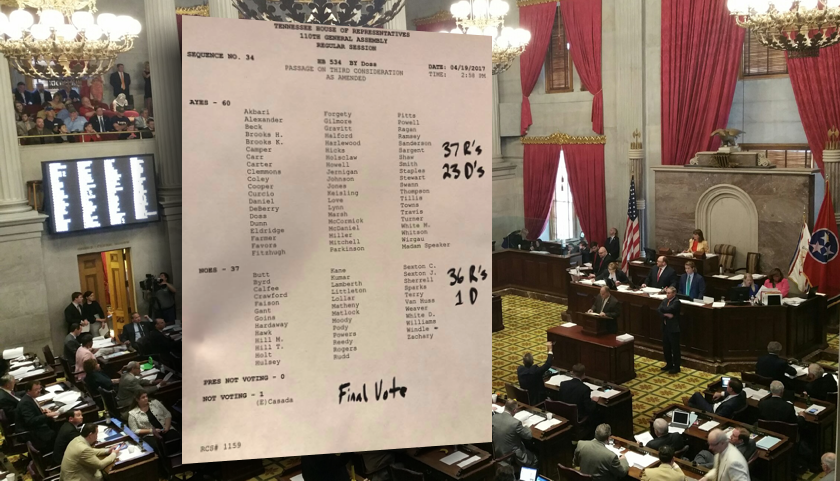
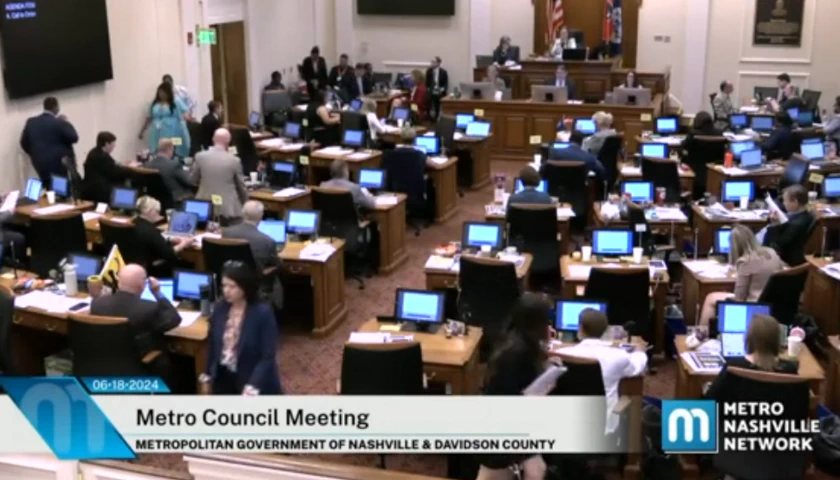

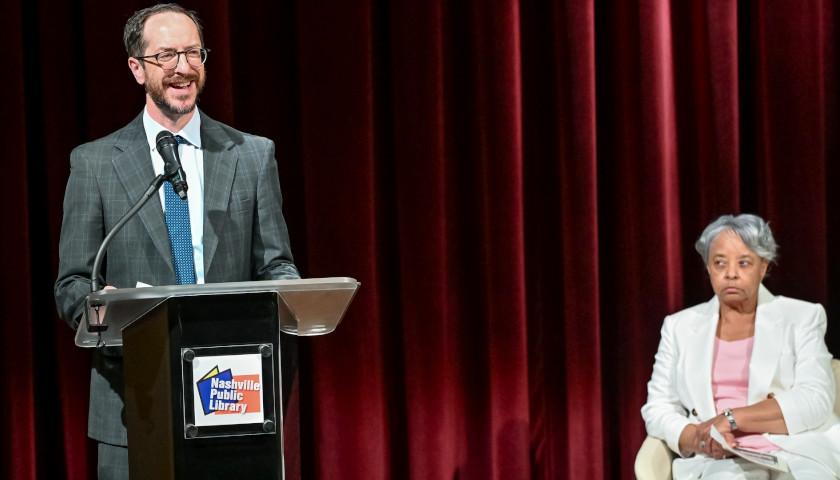
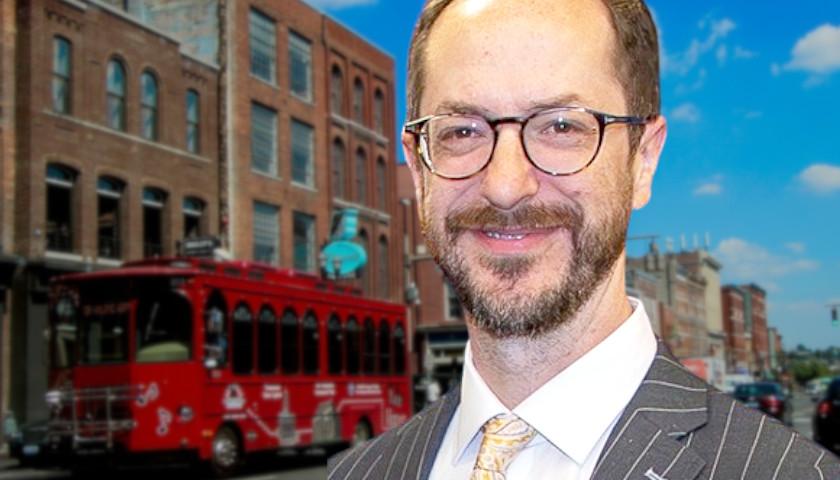
[…] in surplus and recurring revenues, Governor Bill Haslam and Republican legislative leadership jammed through a $330 million a year fuel tax increase last year, which is phased in over three years. The […]
[…] in surplus and recurring revenues, Governor Bill Haslam and Republican legislative leadership jammed through a $330 million a year fuel tax increase last year, which is phased in over three years. The […]
[…] The gas tax increases were phased in over three years. The first 4 cents per gallon increase went into effect on July 1, 2017. An additional 1 cent per gallon gas tax increase goes into effect today, and the final 1 cent per […]
[…] But it won’t be all smooth sailing for the would-be County Mayor, as he was a staunch supporter of Governor Haslam’s unpopular IMPROVE Act, which was passed by the Tennessee General Assembly this session. The gas tax increase included in the IMPROVE Act went into effect across the state on Saturday. […]
We don’t need a governor like Haslam in office. We have to vote him out.